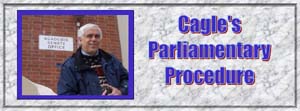
Link to Cagle's Questions page and index.
Link to Cagle's Parliamentary Procedure page.
Thank you for maintaining this website.
I am a member of the Board of Directors of a very competitive figure skating club in the U.S.
We are comprised of 9 board members with a membership of 250. We hold monthly board meetings and 3 General Membership meetings per year.
We are struggling with an issue that seems confusing to me in Robert's Rules which are a part of our bylaws.
When we vote a a board, some board members want their vote kept confidential. Some of us feel that our voting record should be a part of the minutes.
What is correct? We vote by the procedure of : "All in favor say Aye, (with hands raised) or, "All in favor say No, (with hands raised).
It is not a roll call procedure however. I have read Roberts Rules but must say I become confused by the specific clarification.
Thank you very much for your time in this matter.The normal rules are that the outcome of votes is recorded in the minutes, but not how each person voted. Normally only
whether motions pass or fail is recorded.
If someone asks for a division of the house, then the votes are counted and the outcome is noted in the minutes (e.g., the
motion passed 6-3).
If someone desires a roll call vote, he/she can move to have a roll call vote (requires a second and a majority to pass).
The effect is to place on record how each person votes. This motion would be in order in the board meetings because the
members represent the membership of the organization, but the motion would not be in order at a general membership
meeting because each member represents only him/herself.
I hope these points clarify the situation for you.Dr. Cagle, could you take a moment to explain the following: If the normal rules are that outcomes of votes are recorded in the minutes but not how individuals voted, can these board members demand confidentiality of their vote? Can they demand that I practice that confidentiality if questioned by a membership that we are all answerable to? Can the "majority" of these board members vote in a confidentiality policy? It seems impossible to me that this would be so.
The focus in parliamentary procedure is on the collective decision of the group. Just as in debate speakers address comments to the chair and not to individuals in the meeting, in voting the focus in on the outcome of the votes and ought not to be on individuals. If there is a quorum, the group has a right to make decisions by majority votes.
Below I described how a motion to have a roll call vote on a question is handled.
Any group, within the scope of its bylaws and any applicable higher laws, can by motion (majority vote) move into an executive session, at which the proceedings are confidential. The act of moving into and out of executive session must be recorded in the minutes of the meeting, but the proceedings within the executive session are confidential to the executive session.
Sturgis' Standard Code of Parliamentary Procedure even says that boards and committees normally operate in closed session.
I hope these points are helpful to you.
Return to Cagle's Questions page and index.
Link to Cagle's Parliamentary Procedure page.